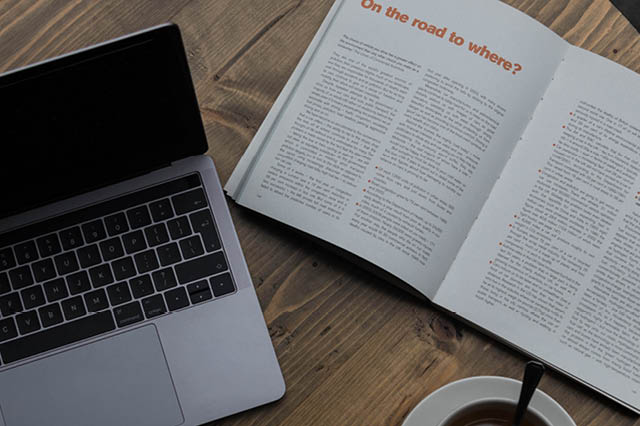Clerkship applications as storytelling
By Renee Zou, Lawyer
Writing a cover letter is like telling a story. Your plot may not be as thrilling as Gone Girl, or as inspiring as Malala Yousafzai's memoir, but the intended outcome is the same: to form a connection with your reader (ie the recruiter) and encourage them to get to know you more. In this case, by inviting you for an interview.
Thinking of your application as a narrative is particularly important when it comes to clerkships, where law firms receive hundreds of high quality applications every year. Creating a compelling and thoughtful set of documents that stand out to the recruiter is key. Like any good book, your application should be 'unputdownable' (or at least 'un-skipped-over-for-an-interview'). Contrary to clerkship folklore, you don't have to win a Nobel Peace Prize to achieve this.
In this article, I pose five questions that, if you reflect upon, will help you think through how you can write compelling, readable and unique documents – commonly your cover letter, CV and short answer responses – for your clerkship application.
1. Who is your audience?
Always keep this question at the front of your mind. For clerkship applications, your primary audience is most likely a recruiter who's read hundreds of documents before yours. So, think through:
- Is your document easy to read, in terms of font, sentence structure, and formatting?
- Can your recruiter, whom you have never met, get a (positive) sense of who you are through your application?
Once you turn your mind to your reader as the focus, you'll find plenty of ways to sharpen your application. For example, if your reader is a time-poor recruiter, you may decide that having less on a page is more effective than having more. You may then decide to remove or shorten a couple of out-of-date work experiences or hobbies. We're not saying that these experiences have become irrelevant with time. At Allens, we have often encouraged applicants to include all experiences – both in and out of the law – in their application, as we believe in looking at a person holistically. So, all experience is relevant.
However, there's also value in being selective in the experiences you choose to share – it's part of crafting your narrative. Having only a few pages to put your best foot forward and balancing completeness with keeping your CV sharp, short, and succinct is important.
Thinking hard about your audience enables you to find the right balance between competing qualities, and make difficult trade-offs.
2. What is your narrative?
It's important to consider what you're showcasing about yourself throughout the application process. To do so, it's helpful to think through the following:
- What are your key strengths?
- What are the life experiences that have contributed to those strengths?
For example, are you known as a hardworking person? If so, how did you gain this reputation? Did you work throughout university to support yourself? Think about your positive attributes and the different contexts where you have demonstrated and strengthened these qualities. I have a friend who included being resilient as his key strength. To support this, he shared how he grew up in a single-parent family, and had to support his mother by taking up part-time work throughout university. It was a compelling narrative, and created a shared human perspective with the person reading his application.
3. How much detail do you need?
Once you've identified your key strengths, think through how much detail is appropriate and adequate to share. Generally, I would do the following:
- include dot points of my strengths in my CV;
- link these strengths to why they are valuable to the firm in my cover letter; and
- include a lengthier explanation of how I attained these strengths if there are short answer responses.
For example, if I list teamwork skills on my CV, I would share that this makes me a good cultural fit for the collaborative approach at the firm, and then, in the short answer responses, explain how I developed my teamwork skills while working part time during university. You should never fabricate details or experiences in your application documents. Aside from it being unethical, it's quickly found out and difficult to move past reputationally whether you do or don't land a clerkship - so just be yourself!
4. Does your application flow?
When crafting your application, it's easy to forget what you have or haven't already mentioned, and get lost in the weeds of the particular document you are working on, whether it's your CV or cover letter. I realised the importance of having a cohesive set of documents while reviewing a friend's application. I noticed a throwaway line at the bottom of her cover letter about one of her hobbies, playing bag pipes in a band. There were no other mentions of this valuable (and intriguing!) experience elsewhere in her application documents, which was such a missed opportunity to demonstrate and explain a unique aspect of her life and interests.
Before submitting your application, always zoom out to see if all your documents sit cohesively as one. Consider these things:
- Do the dates match up?
- Are your documents 'water-tight'? For example, are all experiences listed in your cover letter also captured in your CV?
- Between all your documents, do they capture your narrative accurately and compellingly?
Having a good flow of documents not only shares your story cohesively, it also helps your recruiter easily refer to one another without getting lost and confused, which is a big time saver.
5. Is it compelling?
Whether we invest in a story (either in books or candidates) depends on whether we thought it was a compelling one. Think through:
- Have you 'sold' your skills, strengths, hobbies and experiences in a realistic way? When you think through this, critically consider whether you either oversold (puffed up) or undersold (watered down) any of your experiences.
- Are there typos and grammar mistakes? They're my pet peeve in a book, and definitely a recruiter's when it comes to candidate applications.
- Do the sentences make sense? By the time you submit your application, you may be so accustomed to reading through your documents that it's easy to assume what they mean. Always get a friend, family member, or colleague to read through your documents and pick out anything that doesn't make sense to them.
Thinking of your clerkship application as a form of storytelling, with yourself as the crafter of the narrative, helps ease the slog of clerkship applications. Generally, this way of thinking also produces a compelling, genuine and interesting product at the end.
Additionally, I've found this has helped me to be a better writer generally, which is helpful in law and almost every other profession! We hope these tips are helpful as you embark on the application journey, and that you gain a lot out of this process, both personally and professionally.
Looking for more about clerkships?







